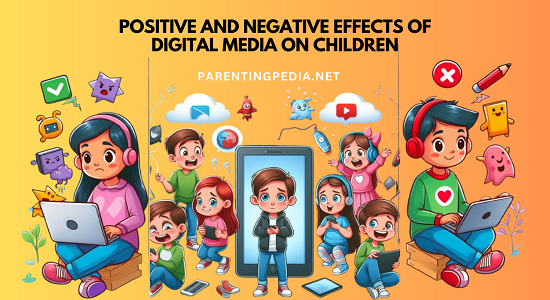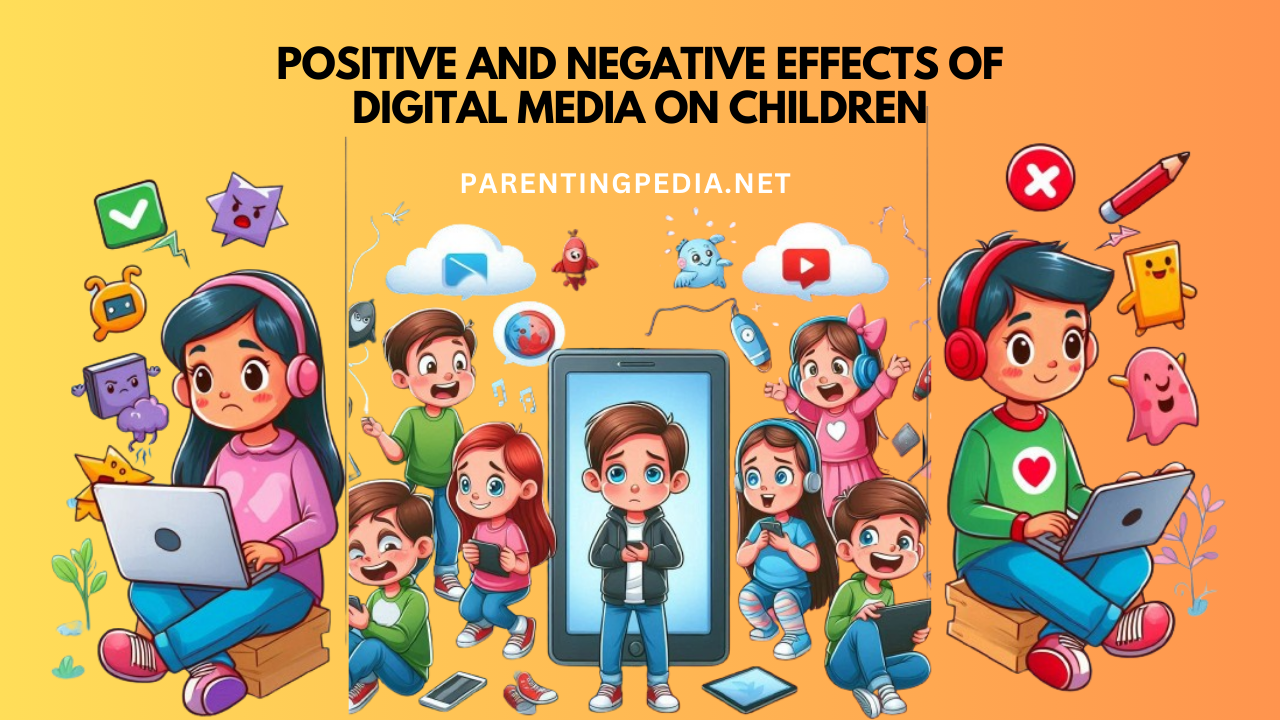Digital media has become an integral part of modern life in today’s time. It is deeply influencing the lives of children and teens along with adults too. It has become an addiction in today’s world where almost all people are excessively consuming digital media. It is hugely impacting lives of children, offering both benefits and challenges. On positive side, it provides educational resources, enhances cognitive skills and encourages creativity in children. Similarly, negative effects of digital media includes physical health issues and mental health concerns due to excessive use. This article explores both the positive and negative effects of digital media on children and its effect on mental health and physical well-being of children.
Positive Effects Of Digital Media On Children
There are many positive effects of digital media which includes easy access to information, social connectivity, intellectual development of child, skill development and more:
1. Educational Benefits
Digital media offers vast educational resources that significantly help in learning process. There are tons of educational apps, videos, and even interactive games that teach new concepts to children in engaging ways. For example:
Interactive Learning: Tools like Khan Academy and Duolingo offer interactive lessons with children and use different learning styles so that child can learn new concepts in easy way.
Access to Information: The internet provides instant access to huge information regarding variety of topics, allowing children to research and expand their knowledge beyond the classroom.
Skill Development: Educational games and apps can help develop critical thinking, problem-solving, and technical skills in children.
2. Cognitive Development
Engagement with digital media can also contribute to cognitive development of child in various ways:
Enhanced Visual-Spatial Skills: Visual-spatial skill is ability to mentally manipulate 2-dimensional and 3-dimensional figures. Video games, particularly those that require strategy and spatial awareness can improve visual-spatial skills and hand-eye coordination.
Improved Multitasking Abilities: Certain types of digital media such as educational video games and social media platforms can enhance a child’s ability to multitask and process information quickly.
3. Social Connectivity
Digital media helps in maintaining social connections especially with those who live far and provide platforms for social interactions:
Communication: Social media and messaging apps help children to stay in touch with friends and family. It helps to maintain connection even if someone lives far away.
Collaboration: Online forums and collaboration tools enable children to work together on projects, even when they are physically apart.
Also Read: Not Just About Screen Time: Why a Healthy Digital Diet Matters
4. Creativity And Self Expression
Electronic media helps children in showcasing their creativity and self expression through various platforms:
Content Creation: Platforms like YouTube and Instagram allow children to create and share their own content, promoting creativity and self-expression.
Art and Design: Digital tools available online help children to experiment with art, music and design in various ways.
5. Entertainment and Leisure
Digital media offers a wide range of entertainment options like movies, music, games, web series etc. to enjoy and relax your mind.
Relaxation and Stress Relief: Engaging with digital media can be a way for children to relax and unwind after school or other activities.
Cultural Exposure: Access to global content on internet exposes children to different cultures and perspectives, broadening their understanding of the world.
Negative Effects Of Digital Media On Children
1. Impact on Physical Health
Excessive use of digital media can have detrimental effects on children’s physical health:
Sedentary Lifestyle: Prolonged screen time can contribute to a sedentary lifestyle, leading to issues such as obesity and health related problems in children.
Eye Strain: Extended periods of screen use can cause eye strain, discomfort, and potentially lead to long-term vision problems in children at very young age.
2. Mental Health Concerns
Digital media can also impact mental health of child in various negative ways:
Anxiety and Depression: Excessive use of social media has been linked to increased feelings of anxiety and depression. Consuming digital content can increase fear of missing out and feelings of inadequacy in children, leading to symptoms such as stress and loneliness.
Sleep Disturbances: The use of screens, especially before bedtime, can interfere with sleep patterns, leading to sleep deprivation and related health issues in children.
3. Social Skills and Development
While digital media can promote social connections, it can also hinder the development of real life social interactions:
Reduced Face-to-Face Interaction: Over dependence on digital communication can result in reduced face-to-face interactions, which are crucial for developing real life social skills and empathy.
Cyberbullying: The anonymity of the internet can sometimes lead to cyberbullying, which can have severe emotional and psychological effects on children.
4. Exposure To Inappropriate Content
The internet provides access to a wide range of content, some of which may be inappropriate for children:
Violence and Explicit Content: Children may be exposed to violent or explicit content that is not suitable for their age, which can impact their behavior and psychological state.
Misinformation: There is way too much information on internet that is either fake or incorrect which can lead to confusion and development of incorrect beliefs in children at an early age.
5. Attention and Focus Issues
Overuse of digital media can affect child’s attention span time and ability to focus:
Shortened Attention Span: Constant exposure to quick, engaging content like Instagram reels and You tube shorts can shorten attention span time of children and make it difficult for them to engage in longer, more demanding tasks.
Distraction: The temptation of using digital media can distract children from important day-to-day activities such as homework, reading, and physical play.
Balancing The Effects Of Digital Media
Given the prevalent presence of digital media in children’s lives, it is important for them to find a balance that maximizes its benefits while reducing its negative impacts. Here are some strategies for achieving this balance:
1. Setting Limits
Parents and educators can set reasonable limits on screen time to ensure that children engage in a variety of other activities:
Screen Time Guidelines: Establishing clear rules about when and how long children can use digital devices can help prevent excessive use of digital media.
Encouraging Offline Activities: Apart from using digital media, child should engage in other activities such as sports, reading, and outdoor play for healthy balance in life.
2. Monitoring Content
Monitoring the content that child consume can help protect him/her from inappropriate material:
Parental Controls: Utilizing parental control features on digital devices can help filter out unsuitable content for children especially of younger age.
Open Communication: Encouraging open communication about what children are watching and playing can help parents understand and guide them about using digital devices.

Conclusion
Needless to say, digital media has huge impact on lives of children, offering both significant benefits and potential drawbacks. While it provides valuable educational resources, intellectual stimulation, and opportunities for social connection and creativity, it also poses risks to physical and mental health, social development and cause short attention span. By setting limits, monitoring content, promoting healthy habits, educating about digital literacy, and encouraging positive use, parents and educators can help children use digital media safely and effectively, maximizing its benefits while minimizing its negative effects.
FAQ
What is the positive impact of electronic media on children?
Electronic media positively impacts children by providing educational resources, enhancing cognitive skills, promoting social connections and encouraging creativity. It offers interactive learning opportunities, improves visual-spatial abilities, and enables communication and collaboration, contributing to well-rounded development of children.
How can digital media negatively affect a child?
Digital media can negatively affect children by contributing to physical health issues like obesity and eye strain, mental health problems such as anxiety and depression, reduced social skills due to less face-to-face interaction, exposure to inappropriate content, and shortened attention span time, hindering their overall development and well-being.
Remember, the greatest reward of parenting lies in watching
your children soar with love and confidence.
Till then keep smiling and be happy
🎉 Score Freebies by Completing Fun Offers – Start Now!

